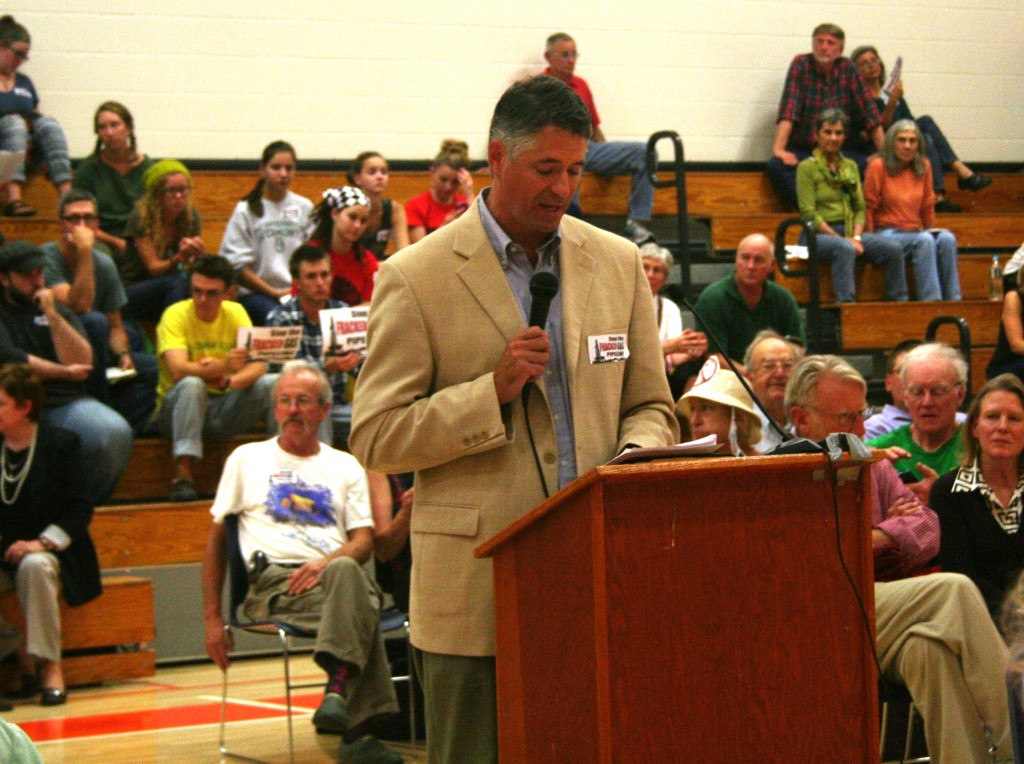Statement of VPIRG Executive Director Paul Burns
concerning the proposed fracked gas pipeline to Middlebury
VPIRG is the largest consumer and environmental advocacy group in Vermont. For over forty years, we’ve been involved in energy issues in the state – working to stop dirty, dangerous and expensive projects and support clean energy solutions.
VPIRG’s approach to our energy work is simple: so long as Vermonters are consuming energy, we have a responsibility to waste less and produce what we can in a sustainable way. There is no excuse for exporting harm to people or the environment when there are clean, local and affordable energy options available right now. Therefore, VPIRG believes that the proposed fracked gas pipeline is a mistake and it should be stopped.
Last year, VPIRG helped to lead a campaign that made Vermont the first state in the nation to formally ban fracking for gas or oil. The petroleum industry lost this fight because Vermonters were deeply concerned about the dangers of fracking and they generally want to see more resources going to conservation and clean energy development.
There’s good reason to be concerned about fracking. In fact, recent evidence makes clear that so-called natural gas can no longer be considered the “clean” fossil fuel.
A typical fracking operation uses 4 million gallons of water and 80 to 330 tons of chemicals, many of which are toxic.[1] Earlier this year, a study of shallow drinking-water wells adjacent to fracking wells in Pennsylvania found contamination in 81% – that’s 115 out of 141 sampled wells.[2] In some communities, the amount of methane and other gas in drinking wells is so bad that some neighboring property owners are able to light the water from their faucets on fire. [3],[4]
The air pollution associated with fracking operations is so bad that in parts of Wyoming, where fracking is common, the air quality is now worse than Los Angeles. [5]
And despite what you might hear from representatives of Vermont Gas Systems, fracked gas is a climate disaster. It’s made mostly of methane which, pound for pound, has 80-100 times the heat-trapping power of CO2 over a 20 year period.[6]
According to one of the Cornell researchers who recently exposed the climate-damaging reality of fracked gas, “Over a 20-year time period, the greenhouse-gas footprint of shale gas is worse than that for coal or oil.”[7]Vermonters were right to say no to fracking in Vermont just over one year ago. It threatens public health while dirtying air and water resources. And it turns out that it could be worse for our climate than even the dirtiest fossil fuels.
If fracking is too dirty, dangerous and costly for Vermont, then we shouldn’t pretend that it’s suddenly acceptable just because it’s coming from Alberta, or Pennsylvania or Ohio.
But a new fracked gas pipeline in Vermont will be an even bigger problem than that because it will stall our progress on implementing clean energy alternatives like air-source heat pumps, solar hot water systems, wood-based home heating or district heating. The price on many of these technologies is coming down rapidly while gas prices will undoubtedly rise over time.
Given the fact that the state’s long-term energy plan calls for 90 percent of Vermont’s total energy to come from renewable sources by 2050, this is the time to focus on efficiency and renewable energy development – not a massive expansion of our dependency on fossil fuels.
Current Vermont state policy is unequivocal as it relates to both fracking and the need to develop renewable energy. A new fracked gas pipeline runs counter to both policies and it should be denied a Certificate of Public Good by the Public Service Board.
1 New York City Department of Environmental Conservation, Impact Assessment of Natural Gas Production in the New York City Water Supply Watershed (December 2009).
2 Nature, “Gas drilling taints groundwater – Chemical analysis links methane in drinking wells to shale-gas extraction” by Tollefson, J (June 2013).
3 ProPublica, “Scientific study links flammable drinking water to fracking” (May 2011).
4 The Los Angeles Times, “Fracking can increase methane in drinking water, study finds” (June 2013).
5 Associated Press, “Wyoming’s natural gas boom comes with smog attached” (March 2011).
6 The Washington Post, “Methane leaks are undermining the shale-gas boom” (April 2013).
7 Nature, “Should Fracking Stop?” by Howarth, RW and A Ingraffea (September 2011).

